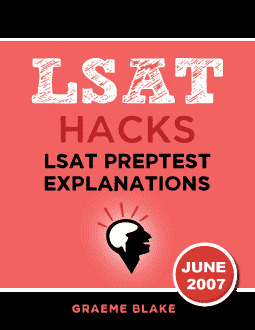QUESTION TEXT: Historian: The Land Party achieved its only national victory…
QUESTION TYPE: Strengthen – Exception
CONCLUSION: The Land Party succeeded because:
- It addressed the concerns of agricultural and small business interests, and
- Because those groups were facing deep problems.
REASONING: The Land Party’s only victory in Banestria was in 1935. The land party got most of its votes in rural areas, where most people lived. The land party specifically targeted agricultural and small business groups, which had been heavily affected by the economic situation.
ANALYSIS: It might seem like the conclusion repeats the reasoning, but that’s not the case. E.g. the Land Party could have succeeded because other groups insulted rural voters, or were corrupt, etc.
To strengthen the argument you can show that the Land Party actually won for the reasons the historian thinks they won.
___________
- CORRECT. It doesn’t matter what happened in past elections. We only care about the 1935 election. Heck, maybe the Land Party was formed in 1935.
If this answer had told us about the 1935 election then maybe it could have helped show that the rural campaign efforts were effective. Where the Land Party campaigned, it got votes. Where it didn’t (urban areas) it didn’t get votes. - This strengthens the link between the Land Party’s focus on agricultural/business voters and those voters deciding to vote for the Land Party as a result.
- Part of the conclusion was that the Land Party won partly due to “the depth of the economic problems people in these groups were facing”.
This answer suggests that when agricultural people faced problems, they voted for the Land Party – so that strengthens the idea that depth of problems is a cause. - If the Land Party was the only party addressing the concerns of the groups, then it makes sense people would vote for it. So this strengthens the historian’s claim that the Land Party won partly by addressing the concerns of those groups.
- The historian concluded that the Land Party won partly due to the depths of the problems faced by agricultural/small business voters. This answer says that since those people were in deep trouble, they were more likely to vote. So that strengthens the link between economic trouble and voting. Assuming those voters were inclined to vote Land Party, economic trouble amongst those groups would increase Land Party votes.


Hi, I love how precise your explanations are. Whenever I had been confused by other explanations, yours are always my salvation.
Thank you! I didn’t see this at the time, but appreciate the kind words.